Essential oils are some of the most useful and long-lasting natural remedies and holistic health products. Eucalyptus and tea tree oils are two of the most common ones. So, when you compare eucalyptus oil vs tea tree oil, which one should you really keep in your home remedy kit?
This full guide will teach you the main differences, pros and cons, uses, safety tips, and expert advice for each. This evergreen resource will help you choose and use these powerful oils with confidence for years to come.
What Are Eucalyptus and Tea Tree Oils? A Basic Guide
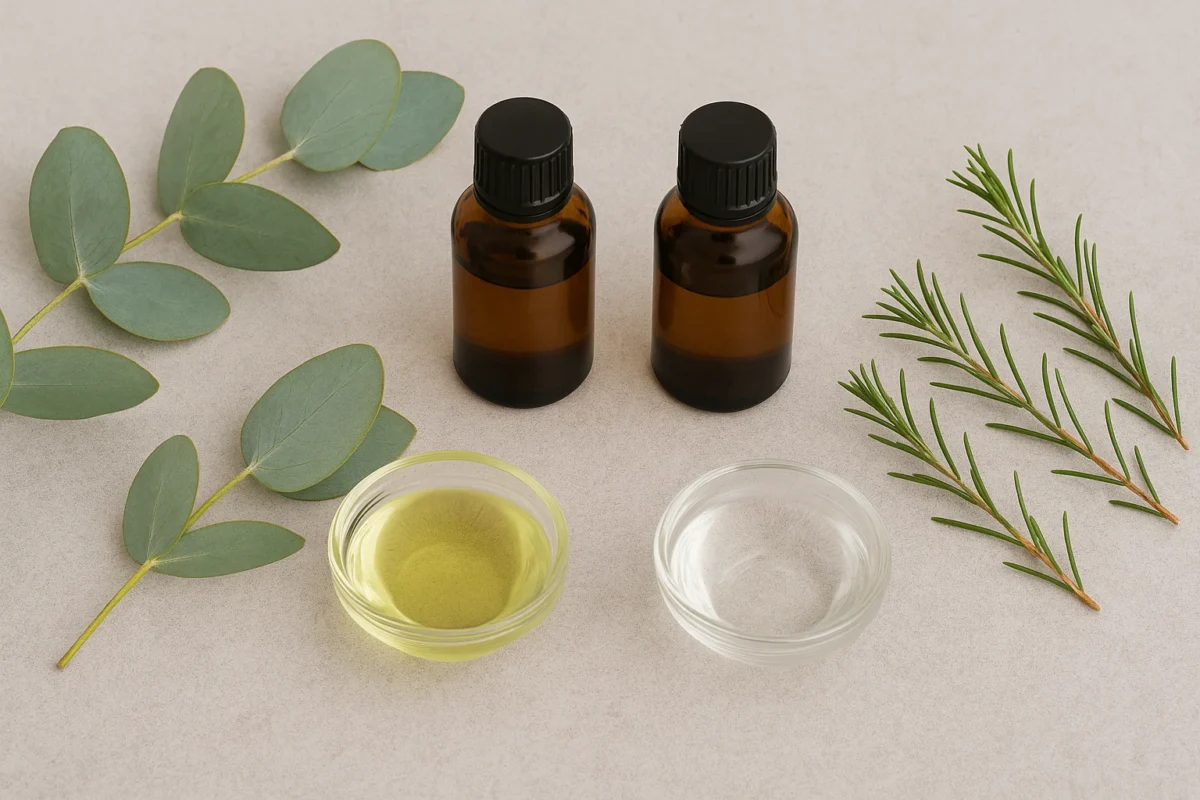
Before we get into the differences between eucalyptus oil and tea tree oil, it’s important to know what they are and how they are made.
What is the Oil from Eucalyptus?
Eucalyptus oil comes from the leaves of eucalyptus trees, mostly Eucalyptus globulus and Eucalyptus radiata. Indigenous Australians have used eucalyptus trees for their healing properties for hundreds of years. They are native to Australia.
The oil is made by steam-distilling the leaves, which makes a clear liquid with a strong, refreshing smell that is similar to camphor. Eucalyptus oil is well-known for its ability to clear up congestion, kill bacteria, and reduce inflammation.
What is Tea Tree Oil?
The Melaleuca alternifolia tree, which grows in Australia’s swamps, is where tea tree oil comes from. Aboriginal people have used crushed tea tree leaves to heal cuts and infections for a long time.
The oil smells fresh and medicinal, and it is highly valued for its ability to kill a wide range of bacteria and fungi. It is one of the most studied and trusted natural antiseptics on the market right now.
Eucalyptus Oil and Tea Tree Oil: What Sets Them Apart
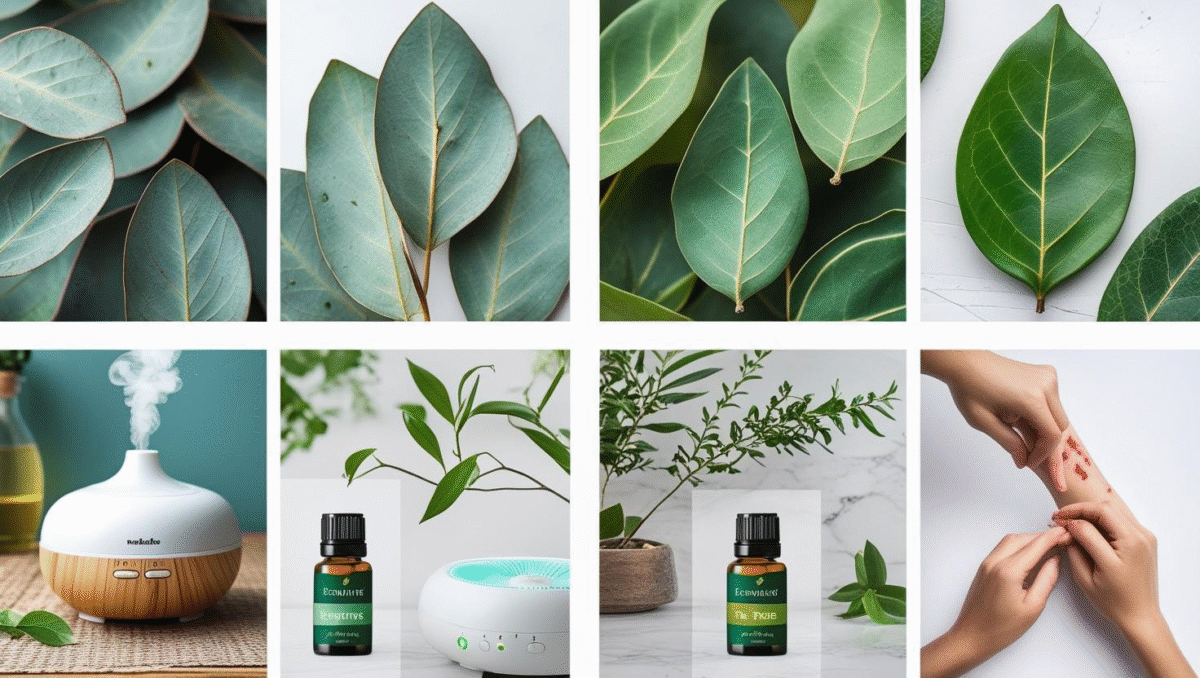
Even though both oils are great for cleaning and healing, they are different in terms of their composition, smell, main uses, and strengths. Here’s a clear side-by-side look:
| Feature | Eucalyptus Oil | Tea Tree Oil |
|---|---|---|
| Source Plants | Eucalyptus radiata, Eucalyptus globulus | Melaleuca alternifolia |
| Scent | Fresh, like camphor, and a little sweet | Sharp, herbal, and medicinal |
| Main Features | Decongestant, anti-inflammatory, pain reliever, and antibacterial | Antimicrobial, antifungal, antiviral, and antiseptic |
| Common Uses | Relieving respiratory problems, muscle pain, and cleaning the air | Acne, skin infections, dandruff, and caring for wounds |
| Safety Considerations | If swallowed, it can be dangerous; make sure to dilute it properly. | Can cause skin irritation; make sure to dilute it correctly. |
The Main Benefits of Eucalyptus Oil
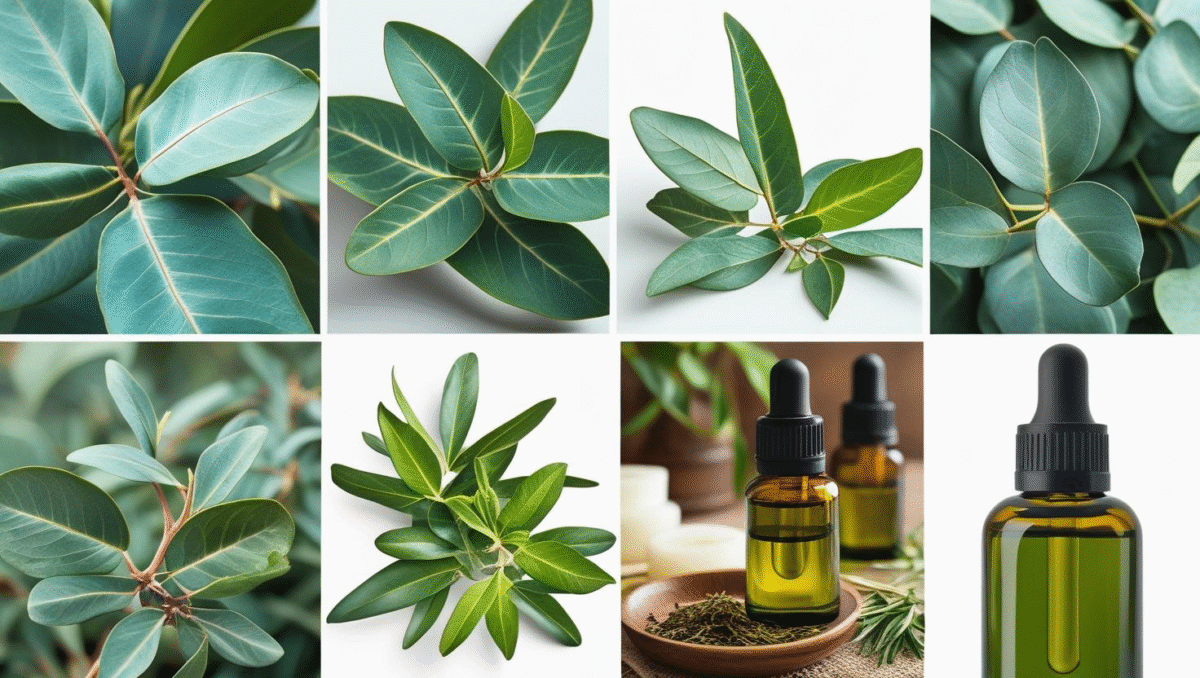
Let’s take a closer look at the long-lasting benefits of eucalyptus oil and how to use it safely and effectively.
Natural Decongestant
Eucalyptus oil has been used for a long time to help with breathing. Cineole, also known as eucalyptol, is the main active ingredient. It helps break up mucus and clear the airways. People have been using eucalyptus oil in steam inhalations or chest rubs to ease coughs, colds, sinus infections, and bronchitis for generations.
How to use:
- Put a few drops in a bowl of hot water, cover your head with a towel, and breathe deeply.
- Or mix it with a carrier oil to make a chest balm at home.
Relief from Pain and Swelling
Eucalyptus oil is a common way to ease sore muscles and joints because it reduces inflammation. Eucalyptus is in a lot of massage oils and topical balms to help with pain and strains by cooling and soothing them.
How to use:
- Mix with a carrier oil, such as coconut or almond oil, and rub it into sore spots.
- You can also put it in a warm bath.
Air Purifier Made from Nature
Eucalyptus oil is great for diffusing at home because it smells good and kills germs in the air. It also gets rid of bad smells.
How to use:
- Add a few drops to an ultrasonic diffuser.
- Make a DIY room spray by combining eucalyptus oil, water, and a splash of witch hazel.
Core Benefits of Tea Tree Oil
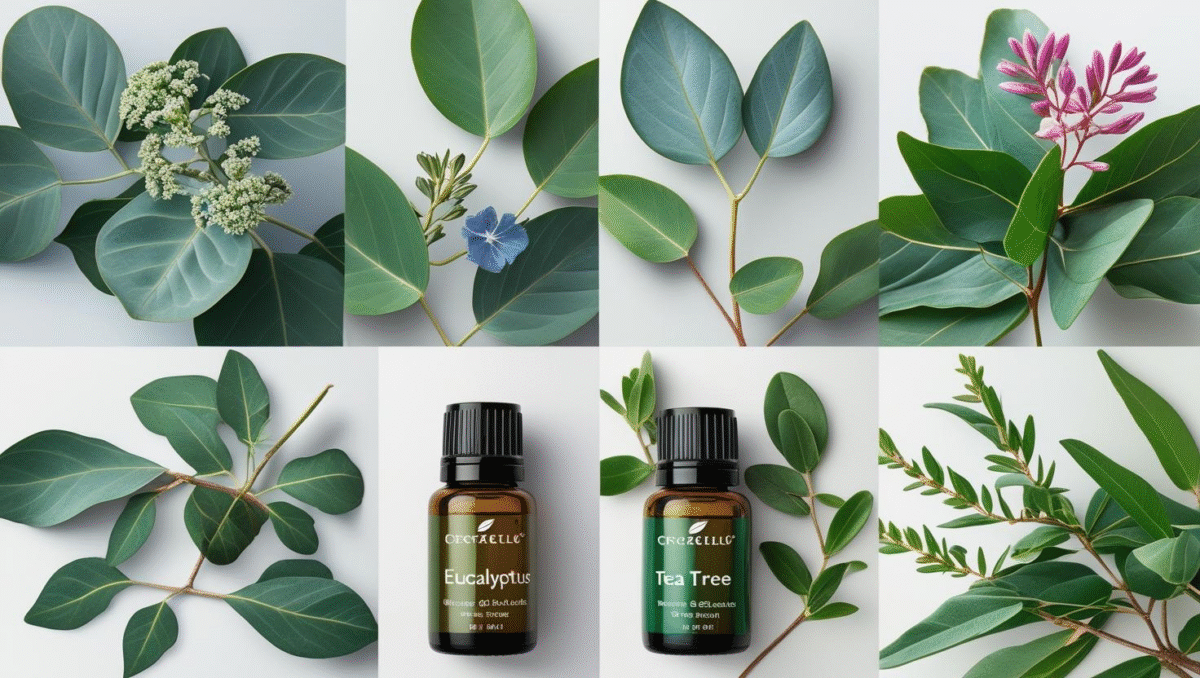
When comparing eucalyptus oil vs tea tree oil, tea tree’s standout strength is its unmatched antimicrobial power. Here’s why this oil remains a must-have:
Trusted Antiseptic
Tea tree oil is one of nature’s strongest antiseptics. Its broad-spectrum antimicrobial properties fight bacteria, fungi, and viruses, making it a go-to for minor cuts, scrapes, and infections.
How to use:
- Always dilute tea tree oil with a carrier oil before applying it to the skin.
- A typical dilution is 1–2 drops per teaspoon of carrier oil.
Acne and Skin Care
Tea tree oil is beloved by many for its proven ability to combat acne. Studies show it reduces inflammation and kills acne-causing bacteria without the harsh side effects of some chemical treatments.
How to use:
- Dilute and dab gently onto blemishes using a cotton swab.
- For sensitive skin, start with a low concentration.
Scalp and Hair Health
Tea tree oil’s antifungal action also makes it a natural remedy for dandruff and itchy scalp. Many shampoos include it to help clear flakes and promote scalp balance.
How to use:
- Add a few drops to your regular shampoo.
- Or dilute in a carrier oil for a scalp massage.
Long-Term Best Practices for Using Both Oils
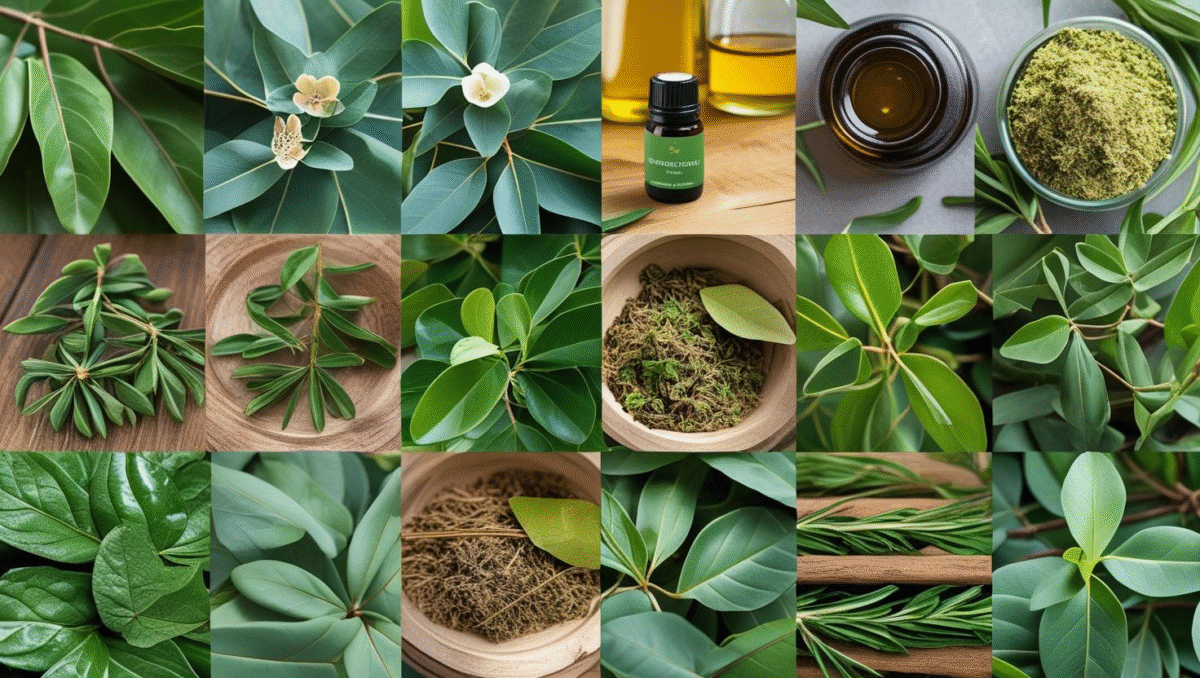
To get the most out of eucalyptus oil vs tea tree oil, it’s vital to follow time-tested best practices that keep you safe and maximize benefits.
Always Dilute Properly
Both oils are potent. Direct application can cause skin irritation, especially for people with sensitive skin or allergies. Experts recommend a dilution of 1–2% essential oil in a carrier oil for topical use.
Patch Test First
Before using either oil widely, perform a simple patch test. Apply a small diluted amount to your inner forearm and wait 24 hours. If there’s no reaction, you’re likely safe to proceed.
Store Oils Correctly
Store your essential oils in dark glass bottles, away from heat and sunlight. Proper storage helps preserve their potency and prevents oxidation.
Choose High-Quality Oils
Not all oils are created equal. Look for reputable brands that provide information on sourcing, purity, and third-party testing. Poor-quality oils may contain additives or contaminants that reduce efficacy and safety.
Practical, Timeless Uses at Home
Here are a few evergreen, practical ways to incorporate eucalyptus oil vs tea tree oil into your daily life.
DIY Natural Cleaner
Both oils have antimicrobial properties, making them excellent for homemade cleaners.
- All-purpose spray: Mix 1 cup of water, 1 cup of white vinegar, 10 drops of tea tree oil, and 10 drops of eucalyptus oil in a spray bottle. Shake well and use to clean countertops and bathroom surfaces.
Sinus Relief Shower
Add a few drops of eucalyptus oil to your shower floor before you step in. The steam will create an invigorating vapor to help clear congestion.
Foot Soak for Fungus
Tea tree oil is a well-known remedy for athlete’s foot and nail fungus.
How to use:
- Fill a basin with warm water, add a handful of Epsom salt, and 5–6 drops of tea tree oil.
- Soak feet for 15–20 minutes.
Expert Insights: When to Use Which Oil
To simplify eucalyptus oil vs tea tree oil, here’s a timeless expert rule of thumb:
- Choose eucalyptus oil when you need to breathe easier, soothe sore muscles, or freshen the air.
- Choose tea tree oil when you’re targeting skin concerns, minor infections, or scalp issues.
Many households keep both oils on hand because they complement each other so well.
Safety Guidelines for Long-Term Use
Essential oils are powerful. Long-term safety depends on wise, consistent use.
- Never ingest: Neither eucalyptus nor tea tree oil should be taken internally without supervision from a qualified practitioner.
- Avoid eye contact: Keep oils away from the eyes, ears, and mucous membranes.
- Keep away from children and pets: Essential oils can be toxic if swallowed or misused.
- Consult a professional: If pregnant, breastfeeding, or managing a chronic health condition, talk to your doctor or a certified aromatherapist before using.
Sustainability and Ethical Sourcing
An often-overlooked aspect of eucalyptus oil vs tea tree oil is sustainability. These trees are generally hardy and renewable, but responsible harvesting and ethical labor practices matter.
Look for brands that source from reputable growers who use sustainable farming and fair trade principles. Supporting ethical producers helps protect the environment and communities that rely on these plants.
Common Myths and Facts
To help this resource stand the test of time, let’s debunk a few myths that often surround these oils.
- Myth: Tea tree oil is a cure-all for serious infections.
Fact: Tea tree oil can help minor skin infections but shouldn’t replace medical treatment for serious conditions. - Myth: Eucalyptus oil can be used safely on young children.
Fact: Experts recommend avoiding eucalyptus oil on or near children under 2 due to risks of respiratory distress. - Myth: More oil means better results.
Fact: Essential oils are highly concentrated. Using too much can cause irritation or adverse reactions.
Real-World Success Stories
Case Study 1: Eucalyptus for Seasonal Colds
Sarah, a teacher, swears by her eucalyptus oil diffuser during winter. By adding a few drops to her humidifier, she keeps her sinuses clear and her classroom smelling fresh, year after year.
Case Study 2: Tea Tree for Acne
Jake, a college student, struggled with breakouts until he switched to a gentle tea tree oil spot treatment. Unlike harsh chemical cleansers, the diluted oil helped clear his skin without drying it out.
Frequently Asked Questions
Q: Can I mix eucalyptus oil and tea tree oil together?
A: Yes, you can. They pair well in cleaning blends, diffusers, and even homemade balms for cough and cold season. Always dilute them properly.
Q: Which oil is better for fungal infections?
A: Tea tree oil is generally more effective for fungal conditions like athlete’s foot or nail fungus.
Q: Which oil is safer for sensitive skin?
A: Both oils can irritate sensitive skin if used undiluted. Many people find eucalyptus to be milder, but always do a patch test first.
Q: Are there any long-term side effects?
A: When used properly and diluted, both oils are safe for long-term use. Misuse—such as swallowing large amounts or applying undiluted oils—can lead to serious health issues.
Final Thoughts: Which One Should You Choose?
When deciding between eucalyptus oil vs tea tree oil, remember there’s no single “winner.” Both oils are powerful tools with unique strengths. For clear breathing, soothing muscle pain, and freshening your home, eucalyptus is your best friend. For skin care, natural antiseptic needs, and fungal concerns, tea tree oil is hard to beat.
Many people keep both on hand, using each as needed. By understanding how to use them safely and wisely, you’ll enjoy their timeless benefits for years to come.
Lasting Takeaways
- ✅ Know the difference: Understand what makes each oil unique.
- ✅ Use them safely: Always dilute, patch test, and store correctly.
- ✅ Keep both in your toolkit: They complement each other perfectly for natural health, cleaning, and wellness.
Whether you’re new to essential oils or a seasoned user, this guide will help you get the most from eucalyptus oil vs tea tree oil—today, tomorrow, and far into the future.









